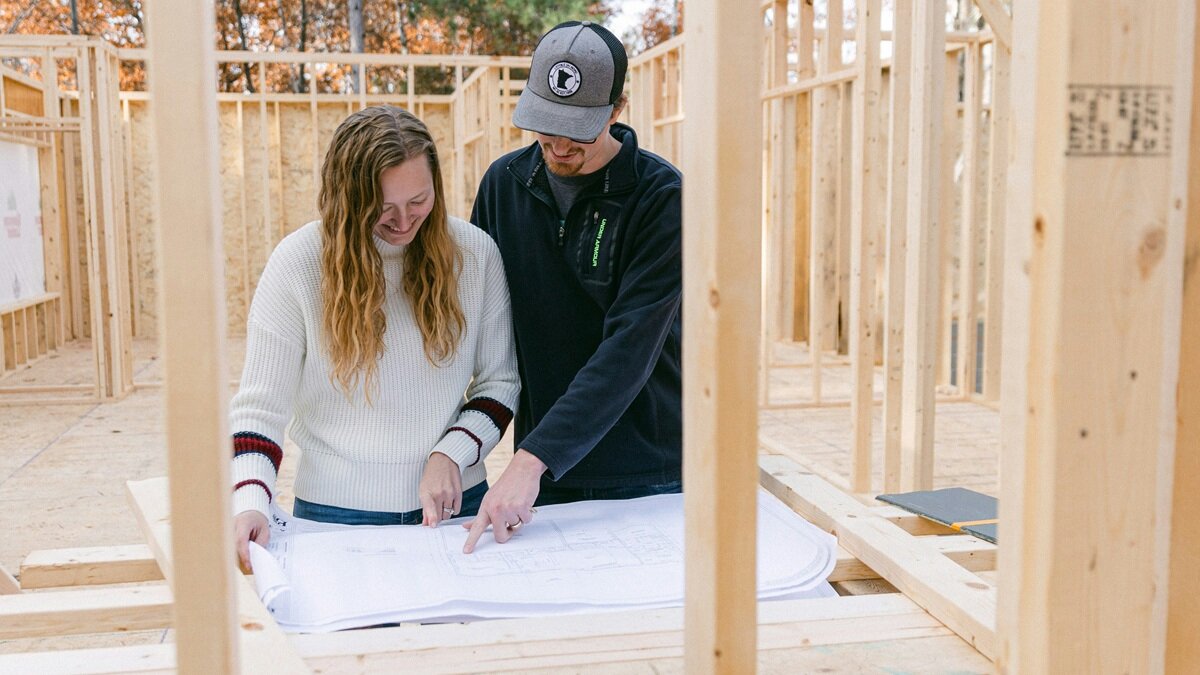Whether you’re buying your first home or purchasing an investment property, one of the earliest decisions you’ll face is whether to buy new or established. While aesthetics and location matter, there are also significant financial implications – some less obvious than others.
So, let's get started on what you should know before choosing to purchase a new home or an established property.
New vs old properties: The basics
Purchasing an 'old' or established property refers to acquiring a property that has already been constructed and lived in, whether it's been standing for a few months or a few decades.
When it comes to property, a 'new' home can take many forms, but essentially means a home that's never been occupied before. It might be an off-the-plan apartment, an already-constructed townhouse that's never been lived in, or a house and land package.
Pros & cons of buying an older home
Pros
For the most part, older homes tend to be found in more desirable locations, thanks to established infrastructure and prior population growth. They're also commonly perched on larger blocks of land or offer more spacious floor plans and can come with hard-to-replicate charm.
Further, an older apartment or 'the worst house on the best street' can provide good value for money.
Finally, an existing home is generally ready to move into as soon as settlement occurs.
Cons
Depending on the location, older homes may come at a higher price, and they can demand more maintenance or even costly renovations. You'll also be buying a property built to someone else's vision.
See also: Crucial things to check when buying a house
Pros & cons of buying a new home
Pros
New homes are typically shiny, built with modern lifestyles in mind, and personalised to an individual's desires. They can also present an opportunity to capitalise on a growing neighbourhood or area, especially for buyers who get in early and push past the pains of a growing suburb (like traffic management, construction noise, and dust).
New properties are also forced to meet energy efficiency ratings, meaning they could be cheaper and more comfortable to live in.
Not to mention, governments often offer grants or tax incentives to those buying or building a new home, as doing so helps stimulate housing supply. (More on these below).
Cons
On the other hand, buying off the plan or building a new home likely means waiting to move in. On top of that, new homes can present their own challenges. Since they haven't had the same amount of time to 'settle' into their 'bones', newer homes can experience cracking in walls or ceilings as the structure adjusts, and sometimes unforeseen defects may only become apparent after you've moved in.
Additionally, if you're buying a strata apartment or unit off the plan, you might want to consider the risk of special levies. On occasion, a new building isn't built in accordance with code and the owners are forced to foot the bill for costly rectification works.
Buying a new vs an old home: Financial and tax considerations
As mentioned above, there are some significant financial considerations to take into account when deciding whether to buy a new home or an established property. And those considerations are particularly impactful for first home buyers and property investors.
Here are some of the financial implications you might want to weigh up, depending on where you're perched on the property ladder.
All home buyers: Stamp duty savings
The most overarching financial difference between buying a new or an established property is related to stamp duty. Stamp duty is a state and territory government tax paid on the purchase of a property.
See also: Your state-by-state guide to stamp duty
The amount of stamp duty a buyer pays is relative to the purchase price of their property.
If you're buying an established house, you'll likely pay stamp duty on the value of the home as a whole – house and land included. Whereas, if you're buying land to build on, you'll only pay stamp duty on the value of the land.
Since stamp duty can add up to tens of thousands of dollars, buying land on which to build can often result in a large stamp duty saving compared to buying an established home. Additionally, some states offer discounted rates to those purchasing units off-the-plan or house and land packages to incentivise housing construction.
First home buyers: Grants and stamp duty concessions
If you're a first home buyer, stamp duty mightn't be a concern for you anyway. Many states and territories discount or even waive the tax for those entering the market for the first time.
However, certain states, like South Australia, only do so for first home buyers who buy or build a new home.
Additionally, many offer first home buyer grants – some worth as much as $50,000 at the time of writing – exclusively to those who buy or build a new property. These grants can often be used to fund a deposit.
Property investors: Tax concessions and incentives
When you buy a property as an investment, you can deduct many costs related to owning that property from your total taxable income. One such cost, according to the Australian Tax Office, is the loss of value realised as a building and its components age – called depreciation.
There are two types of depreciation investors can typically claim:
-
Capital works deductions
For structural elements like walls, flooring, roofing, and fixed assets. -
Plant and equipment deductions
For removable or mechanical items such as air conditioners, carpets, blinds, and hot water systems.
Importantly, only newer properties or those purchased after certain dates may be eligible for full depreciation benefits, particularly for plant and equipment. A quantity surveyor can provide a compliant tax depreciation schedule.
On the other hand, properties built prior to 1987 typically aren't eligible for depreciation claims (though, it might be possible to claim depreciation on more recent renovations). Not to mention, older homes might be more costly to maintain than their newer counterparts.
The final verdict: Is it better to buy a new or established house?
Ultimately, you'll want to weigh up the pros and cons of buying new or purchasing established yourself, factoring in your own needs, wants, and financial situation.
If you're still stuck, here's a breakdown of the major benefits and drawbacks of each option:
| New properties | Old properties | |
|---|---|---|
| Location | Often in outer suburbs or developing areas | Often in established suburbs with mature infrastructure |
| Land size | Often on smaller blocks and floorplans due to modern subdivisions and styles | Often offers larger blocks and/or more spacious floorplans |
| Property design | Modern layouts, open-plan living, smart tech, ensuites | May reflect older styles, with potential need for updates |
| Energy efficiency | Must meet energy standards | May be less efficient or in need of upgrades |
| Upkeep | Low in early years; likely under warranty | May require more upkeep; possible hidden issues or renovation needs |
| Constru- ction risks |
Risk of delays, hidden defects post-build, and cost blowouts | Immediate move-in, can allow for more informed decisions |
| Special levies & defect risks | Potential for strata issues or defect rectification costs | Fewer unknowns, though may still require repairs |
| Stamp duty | Lower if buying land only; potentially allows for concessions or waivers | Duty likely determined based on total property value |
| Governme- nt grants & incentives |
Often eligible for FHB grants or tax offsets | FHB grants typically unavailable |
| Tax benefits (Investor) | Eligible for depreciation deductions | Potentially limited depreciation opportunities, especially if built before 1987 |
| Capital growth | Potential for growth over time but can be unpredictable | Typically reflects historical growth and buyer demand |
| Rental appeal | May attract renters seeking comfort and efficiency | Can appeal to those looking for location, charm, or space |
How to finance a new home build
Building a new home often requires a different type of mortgage. Instead of a traditional home loan, you'll usually need a construction loan – a specialised product designed to fund your build in stages.
Construction home loans see funds released as each stage of the build is completed. This can help keep interest costs lower during the building process, but also means the application and approval process can be a little more complex.
If you're looking for the right construction home loan, here are some of the most competitive available on the market right now:
| Lender | Home Loan | Interest Rate | Comparison Rate* | Monthly Repayment | Repayment type | Rate Type | Offset | Redraw | Ongoing Fees | Upfront Fees | Max LVR | Lump Sum Repayment | Extra Repayments | Split Loan Option | Tags | Features | Link | Compare | Promoted Product | Disclosure |
|---|---|---|---|---|---|---|---|---|---|---|---|---|---|---|---|---|---|---|---|---|
5.69% p.a. | 6.11% p.a. | $2,899 | Principal & Interest | Variable | $395 | $890 | 80% | |||||||||||||
6.09% p.a. | 6.12% p.a. | $2,538 | Interest-only | Variable | $0 | $450 | 80% | |||||||||||||
6.74% p.a. | 7.17% p.a. | $2,808 | Interest-only | Variable | $20 | $644 | 90% |
Image by Jennifer Kalenberg on Unsplash
Collections: Buying a home Construction & Renovation Insights







Share